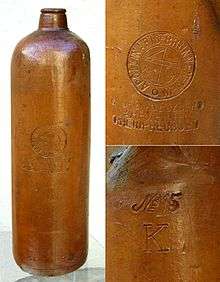Apollinaris (water)
 | |
| Country | Germany/USA |
|---|---|
| Source | Bad Neuenahr-Ahrweiler |
| Type | sparkling |
| pH | 5.8 |
| Calcium (Ca) | 90 |
| Chloride (Cl−) | 130 |
| Bicarbonate (HCO3) | 1800 |
| Fluoride (Fl) | 0.7 |
| Magnesium (Mg) | 120 |
| Nitrate (NO3) | 1.6 |
| Potassium (K) | 30 |
| Sodium (Na) | 470 |
| Sulfates (SO4) | 100 |
| TDS | 1600 |
| Website | apollinaris-gmbh.de |
| All values in milligrams per liter (mg/l) | |

Apollinaris is a German naturally sparkling mineral water, owned by Coca-Cola.
History
The spring was discovered by chance in 1852 in Georg Kreuzberg’s vineyard, in Bad Neuenahr, Germany. He named it after St Apollinaris of Ravenna, a patron saint of wine. The red triangle symbol and the slogan "The Queen of Table Waters" were adopted as trademarks in 1895. By 1913 the company was producing 40 million bottles a year, 90% of which were exported worldwide.
Today the source and the brand of Apollinaris belong to Coca-Cola, which acquired it from the multinational Cadbury-Schweppes in 2006.
Sports sponsorship
In the 1950s and 1960s, Apollinaris co-organised (with the Torck factories of Deinze, Belgium) the commercial beach games "Les Rois du Volant/De Koningen der Baan" on the Belgian coast.[1]
Cultural references
In William Dean Howells's The Rise of Silas Lapham (1885), the Laphams attend a dinner party at the Coreys. After dinner, the men remain in the dining room smoking cigars, and one of the guests "reached him a bottle of Apollinaris," filling a glass for Silas. "He drank a glass, and then went on smoking."[2]
The Susan Coolidge book "Clover" (1888), part of the Katy Series, mentions the water during a private train journey to Colorado: ""The car seems paved with bottles of Apollinaris and with lemons," wrote Katy to her father....Just as surely as it grows warm and dusty, and we begin to remember that we are thirsty, a tinkle is heard, and Bayard appears with a tray,--iced lemonade, if you please, made with Apollinaris water with strawberries floating on top! What do you think of that at thirty miles an hour?""[3]
The Jerome K. Jerome novel, Three Men on the Bummel (1900) contains a description of the product: “There is Apollinaris water which, I believe, with a little lemon squeezed into it, is practically harmless."
The Lost World by Sir Arthur Conan Doyle (1912) includes, in Chapter 9, the passage: "We supped and camped at the very edge of the cliff, quenching our thirst with two bottles of Apollinaris, which were in one of the cases."
The water receives a brief mention in the short story "Counterparts" by James Joyce, included in his collection Dubliners (1914): "Farrington stood a drink all round. Weathers said he would take a small Irish and Apollinaris. Farrington, who had definite notions of what was what, asked the boys would they have an Apollinaris too."
In E. F. Benson's novel Lucia's Progress (1935), the character Lucia discovers a fragment of glass marked with the letters "Apol", and concludes that the remains of a Roman temple lie beneath her garden. She subsequently finds the rest of the bottle, which supplies the full inscription "Apollinaris", and promptly ceases her excavations.
In the Ealing Studios film comedy My Learned Friend (1943), bumbling barrister Mr. Babbington (Claude Hulbert) orders a 'Baby Polly' in a disreputable 'café' in Stepney.
Short story author O. Henry references Apollinaris in different stories including "The Social Triangle," "The Unprofitable Servant," and "The Lost Blend."
In the UK and Ireland, Apollinaris was sold in small bottles, which were marketed as "The Baby 'Polly". The poem "Sun and Fun" by Sir John Betjeman, published in 1954, includes the stanza:
I pulled aside the thick magenta curtains
– So Regency, so Regency, my dear –
And a host of little spiders
Ran a race across the ciders
To a box of baby 'pollies by the beer.
In the film American Psycho (2000), Patrick Bateman, played by Christian Bale, offers Detective Kimball (Willem Dafoe) a bottle of Apollinaris, which he politely tries to refuse. Bateman insists, also offering a lime.
During World war One, rival manufacturer Perrier ran an advertisement urging people to drink their French water, rather than that of their German rival.
The German language documentary Hitlers Todesbrigaden (2010), made by Andreas Novak, includes a reenacted scene in which Apollinaris bottles appear prominently on a serving tray brought to Nazi officers.
See also
- Mineral water
- Perrier
- Badoit
- Evian
- Farris
- Gerolsteiner Brunnen
- Panna
- San Pellegrino
- Ramlösa
- Spa
- Rosbacher
References
- ↑ http://www.autotitre.com/forum/Car-publicitaire-Apollinaris-108848p1.htm
- ↑ https://books.google.com/books?id=hR0GAAAAQAAJ&dq=rise%20of%20silas%20lapham%20ticknor&pg=PA282#v=onepage&q&f=false
- ↑ https://www.gutenberg.org/ebooks/15798
 This article incorporates text from a publication now in the public domain: Ward, Artemas (1911). The Grocer's Encyclopedia.
This article incorporates text from a publication now in the public domain: Ward, Artemas (1911). The Grocer's Encyclopedia.